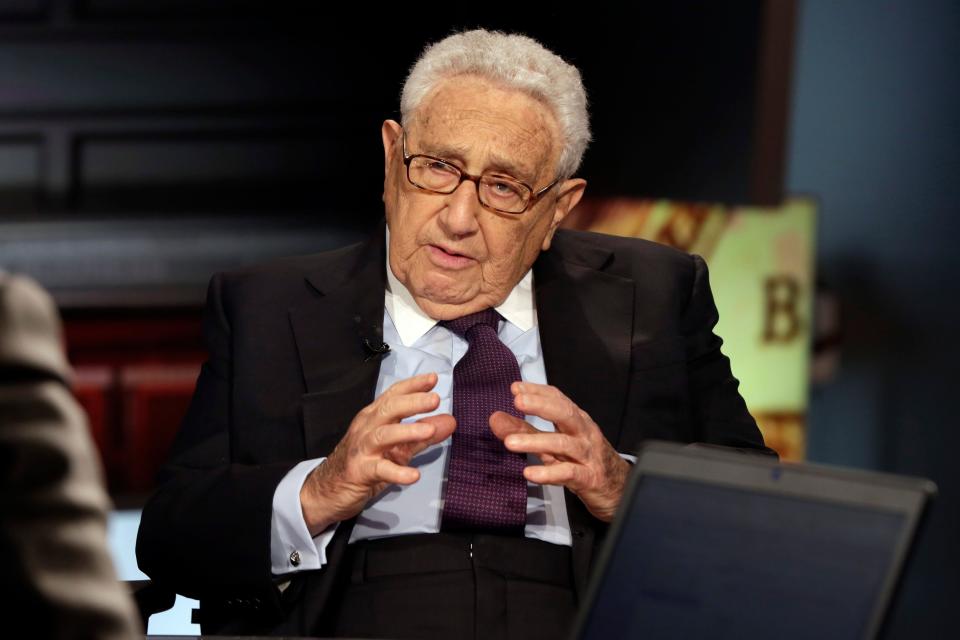Opinion: The legacies left behind from Kissinger and O’Connor
- Oops!Something went wrong.Please try again later.
Henry Kissinger and Sandra Day O’Connor, two GOP icons, recently passed away. I never met O’Connor, but I did have a chance to spend time with Kissinger.
In the '90s, I was head of development for a well-known healthcare company, Premier. I was also interested in politics, leaning to the left (rare for a corporate executive). So, when the chance to spend time with Kissinger presented itself, I jumped on the opportunity.
Henry was the keynote speaker for a private gathering of over 100 hospital system CEOs in Aspen, Colorado. I picked him up at the airfield and spent the much of the day with him, one on one.
Realpolitik, defined as "politics based on practical objectives rather than on ideals," dominated the political foreign policy of Nixon and Kissinger. There were clear positives of the Nixon/Kissinger approach, including the formal US recognition of China and the calming/normalization of the potentially catastrophic Soviet-U.S. relationship.

But I also disliked the realpolitik philosophy that led to questionable U.S. military action in Cambodia and the U.S.-sponsored overthrow of a democratically elected government in Chile. So, my preconceived notion was that I would find him obnoxious and unbearable, characteristics often cited in press stories about him. I found exactly the opposite.
Henry began the conversation in my car by asking me about myself. We engaged in small talk, including the fact that all my grandparents were immigrants. I mentioned that as a teenager my father, like Henry, fled the Holocaust in Europe for the USA. Kissinger instantly warmed up and wanted to know more about my family. He was a charming person and reminded me of my grandfather.
Even though he did win the Nobel Peace Prize for ending the Vietnam War, I have trouble reconciling the fact that the Henry that I met was the same man who approved the bombing of Cambodia leading to the deaths of 50,000 people. And I also abhorred his advocacy of the CIA-inspired violent overthrow of Chile’s democratically elected President Salvador Allende, a socialist, and the installation of a harsh dictator, Gen. Pinochet.
I have read that Henry was a narcissistic, overbearing person. But I did not see that side of him in person. In fact, a year later, I ran into him in a restaurant and said hello. And he recognized me and was friendly.
Justice Sandra Day O’Connor’s life story is inspiring, as well as a win for the feminist movement. From meager farm beginnings in Arizona, O’Connor rose to be the first female Supreme Court Justice ... after nearly 200 years of men being appointed and no women nominated.
I disagree with much of what the GOP states about the legacy of President Ronald Reagan. However, in 1981, Reagan had the courage and foresight to nominate O’Connor, a moderate conservative, for the Supreme Court. It was a different political time ... and she was confirmed unanimously.
Her impact on court decisions was substantial and her decisions determined based on the facts as she saw them, rather than politics. Although a conservative, on a divided court she was the swing vote upholding the 1973 Roe v. Wade pro-choice ruling.
But in the '80s and '90s, she also voted for restricting affirmative action in selection of contractors and preventing utilizing race as the sole criteria in constructing majority Black congressional districts. However, in a 2003 case she also upheld college admission affirmative action.
On the conservative side, she put George W. Bush in office in 2000 via the 5-4 SCOTUS decision stopping the Florida presidential election recount. But in 2004, she wrote the important SCOTUS decision restricting Bush’s authority to indefinitely incarcerate enemy militants at the U.S. base in Guantanamo Bay, Cuba.
She also did not commit ethical violations, accepting outrageous gifts from people with cases before her (like Justice Clarence Thomas). If the Supreme Court wishes to regain the respect that it once had, we must have more justices like O’Connor, basing decisions on law and precedent. Plus, SCOTUS must construct an ethics policy with strong enforcement provisions, lacking in the current ridiculously weak policy.
Jack Bernard is a retired corporate executive who worked extensively with hospital systems throughout Texas.
This article originally appeared on Corpus Christi Caller Times: Opinion: The legacies left behind from Kissinger and O’Connor

